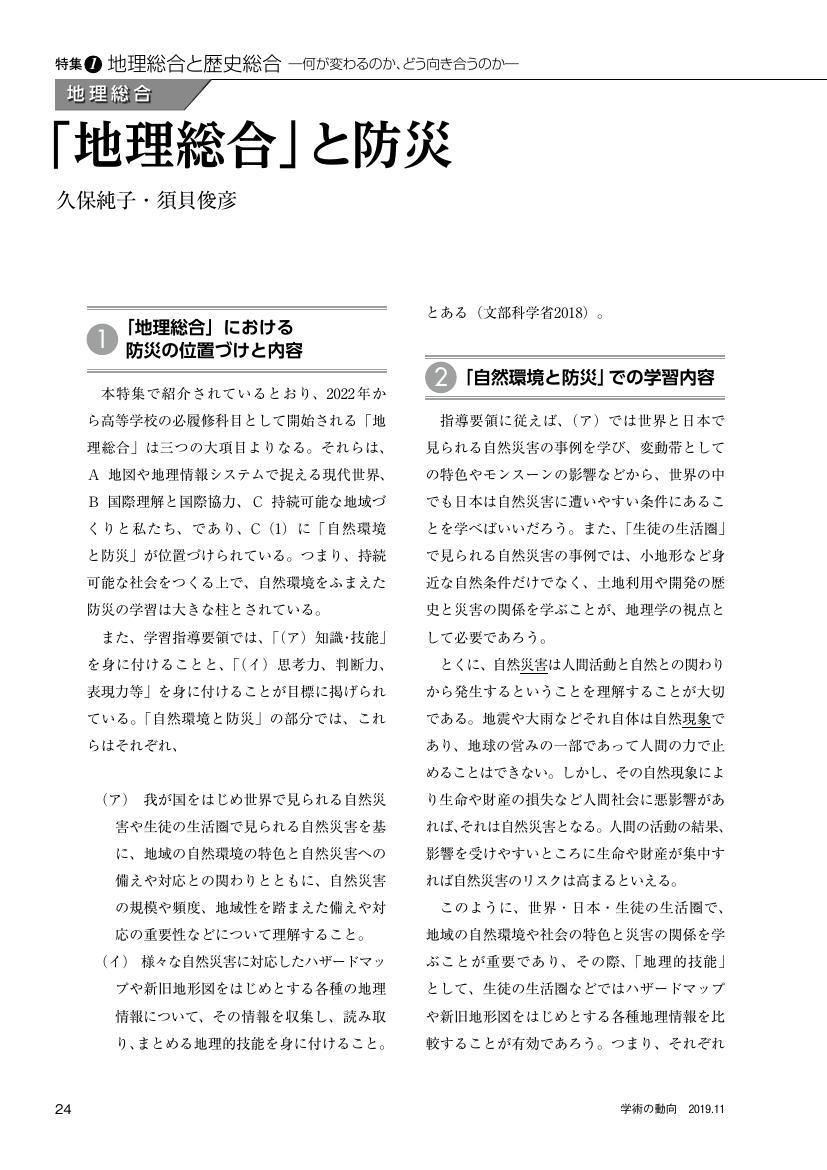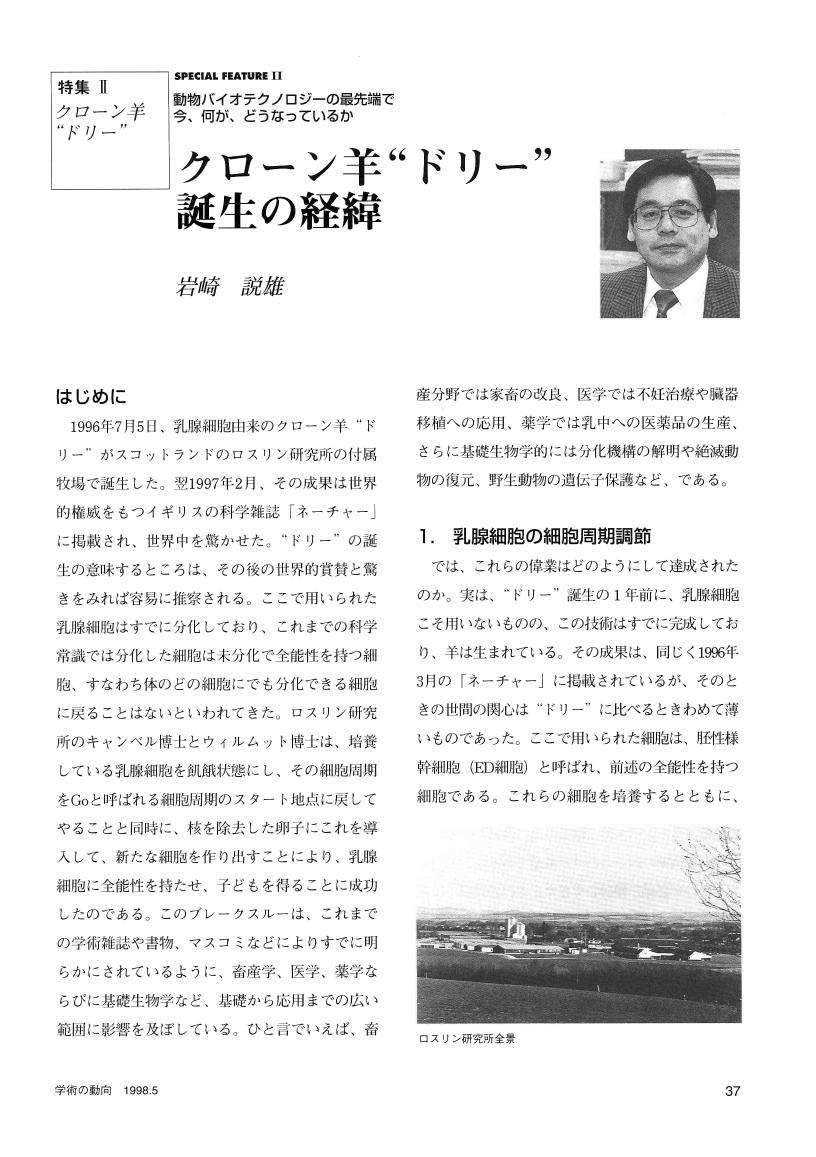1 0 0 0 OA 広告研究の系譜と現状 科学的広告研究成立への道程と課題
- 著者
- 亀井 昭宏
- 出版者
- 公益財団法人 日本学術協力財団
- 雑誌
- 学術の動向 (ISSN:13423363)
- 巻号頁・発行日
- vol.7, no.5, pp.64-68, 2002-05-01 (Released:2009-12-21)
1 0 0 0 OA アジアにおけるエネルギー・水・食料の総合的確保 ─ネクサス研究の新展開
- 著者
- 谷口 真人
- 出版者
- 公益財団法人 日本学術協力財団
- 雑誌
- 学術の動向 (ISSN:13423363)
- 巻号頁・発行日
- vol.23, no.2, pp.2_60-2_63, 2018-02-01 (Released:2018-07-07)
- 参考文献数
- 5
- 被引用文献数
- 2 2
1 0 0 0 OA 人工光合成
- 著者
- 今堀 博
- 出版者
- 公益財団法人 日本学術協力財団
- 雑誌
- 学術の動向 (ISSN:13423363)
- 巻号頁・発行日
- vol.16, no.5, pp.5_26-5_29, 2011-05-01 (Released:2011-09-15)
- 参考文献数
- 5
1 0 0 0 OA 「地理総合」と防災
- 著者
- 久保 純子 須貝 俊彦
- 出版者
- 公益財団法人 日本学術協力財団
- 雑誌
- 学術の動向 (ISSN:13423363)
- 巻号頁・発行日
- vol.24, no.11, pp.11_24-11_27, 2019-11-01 (Released:2020-03-27)
- 参考文献数
- 8
1 0 0 0 OA クローン羊“ドリー”誕生の経緯
- 著者
- 岩崎 説雄
- 出版者
- 公益財団法人 日本学術協力財団
- 雑誌
- 学術の動向 (ISSN:13423363)
- 巻号頁・発行日
- vol.3, no.5, pp.37-40, 1998-05-01 (Released:2009-12-21)
- 出版者
- Japan Science Support Foundation
- 雑誌
- 学術の動向 (ISSN:13423363)
- 巻号頁・発行日
- vol.20, no.6, pp.6_88-6_89, 2015
1 0 0 0 OA 母性的養育の喪失
- 著者
- 辰野 千壽
- 出版者
- 公益財団法人 日本学術協力財団
- 雑誌
- 学術の動向 (ISSN:13423363)
- 巻号頁・発行日
- vol.3, no.10, pp.38-40, 1998-10-01 (Released:2010-03-15)
1 0 0 0 OA 民法学の歴史と法科大学院における民法教育
- 著者
- 淡路 剛久
- 出版者
- 公益財団法人 日本学術協力財団
- 雑誌
- 学術の動向 (ISSN:13423363)
- 巻号頁・発行日
- vol.11, no.10, pp.80-83, 2006-10-01 (Released:2009-12-21)
1 0 0 0 OA 日本学術会議が行ったアンケート調査報告
- 著者
- 石原 宏
- 出版者
- 公益財団法人 日本学術協力財団
- 雑誌
- 学術の動向 (ISSN:13423363)
- 巻号頁・発行日
- vol.19, no.8, pp.8_48-8_51, 2014-08-01 (Released:2014-12-05)
- 参考文献数
- 2
- 著者
- 矢部 拓也
- 出版者
- 公益財団法人 日本学術協力財団
- 雑誌
- 学術の動向 (ISSN:13423363)
- 巻号頁・発行日
- vol.21, no.12, pp.12_26-12_39, 2016-12-01 (Released:2017-04-07)
- 参考文献数
- 35
1 0 0 0 OA 土壌の広域放射能汚染の克服と土地再生への課題
- 著者
- 渡邊 眞紀子
- 出版者
- 公益財団法人 日本学術協力財団
- 雑誌
- 学術の動向 (ISSN:13423363)
- 巻号頁・発行日
- vol.17, no.8, pp.8_32-8_37, 2012-08-01 (Released:2012-12-03)
- 参考文献数
- 16
1 0 0 0 OA ギースの取り組み ─発足そして今後の展望
- 著者
- 青野 篤子
- 出版者
- 公益財団法人 日本学術協力財団
- 雑誌
- 学術の動向 (ISSN:13423363)
- 巻号頁・発行日
- vol.26, no.2, pp.2_84-2_86, 2021-02-01 (Released:2021-06-30)
- 参考文献数
- 4
1 0 0 0 OA 人文学の「国際化」と21世紀中国
- 著者
- 平田 昌司
- 出版者
- 公益財団法人 日本学術協力財団
- 雑誌
- 学術の動向 (ISSN:13423363)
- 巻号頁・発行日
- vol.26, no.4, pp.4_30-4_35, 2021-04-01 (Released:2021-08-27)
During the 17 years from 2003 to 2020, universities in the People’s Republic of China promoted reforms aimed at becoming “world-class” institutions and raising their position in the Times Higher Education World University Rankings. This paper outlines the impact of the so-called World-Class University reforms on humanities fields in China.In 2003, Xu Zhi-min, president of Peking University, unveiled a World-Class University plan that introduced a performance evaluation system to judge professors’ scholarly output. Under this plan, scholars were to be evaluated numerically based on how many papers they published in certain core journals within a certain period of time. They have also been asked to improve their English proficiency, the planned criteria for promotion to full professor included the ability to teach courses in a “foreign language” (in most cases English), and a record of publishing papers at an “international standard” of scholarship. Until recently, it has been common in China to teach courses and to publish research outcomes in the humanities in Chinese-language formats. As a result of plans for “internationalization,” however, scholars—including those working in the fields of Chinese literature, history, and philosophy—have had to justify teaching their courses and publishing their research results in Chinese. Scholars now have pressure to show that their Chinese-language courses and publications meet an “international standard.” The situation in China at the 2003 start of the World-Class University reforms resembles the current situation in Japan, where Japanology is also facing demands to be “internationalized.” The arguments that have been presented for and against the pursuit of “world-class university” status and the promotion of English-language scholarship in China merit consideration in light of conditions in Japanese universities today.In 2020, Peking University was ranked twenty-third in the Times Higher Education World University Rankings. Most courses in the fields of Humanities for Chinese students are still taught in Chinese.
1 0 0 0 OA 日本の医療提供体制の構造的問題
- 著者
- 永井 良三
- 出版者
- 公益財団法人 日本学術協力財団
- 雑誌
- 学術の動向 (ISSN:13423363)
- 巻号頁・発行日
- vol.12, no.5, pp.8-14, 2007-05-01 (Released:2012-02-15)
- 被引用文献数
- 1
1 0 0 0 OA 医療改革のために、今できることは専門医制度の確立である
- 著者
- 桐野 高明
- 出版者
- 公益財団法人 日本学術協力財団
- 雑誌
- 学術の動向 (ISSN:13423363)
- 巻号頁・発行日
- vol.12, no.5, pp.46-51, 2007-05-01 (Released:2012-02-15)
1 0 0 0 「科学的評価」は「正しい」か?
- 著者
- 押川 正毅
- 出版者
- 公益財団法人 日本学術協力財団
- 雑誌
- 学術の動向 (ISSN:13423363)
- 巻号頁・発行日
- vol.17, no.5, pp.5_25-5_31, 2012
- 被引用文献数
- 1
1 0 0 0 OA リスク社会の論点と課題
- 著者
- 今田 高俊
- 出版者
- 公益財団法人 日本学術協力財団
- 雑誌
- 学術の動向 (ISSN:13423363)
- 巻号頁・発行日
- vol.13, no.11, pp.39-42, 2008-11-01 (Released:2012-02-15)
- 参考文献数
- 3
1 0 0 0 OA 憲法の立場から
- 著者
- 武田 万里子
- 出版者
- 公益財団法人 日本学術協力財団
- 雑誌
- 学術の動向 (ISSN:13423363)
- 巻号頁・発行日
- vol.21, no.12, pp.12_94-12_97, 2016-12-01 (Released:2017-04-07)
1 0 0 0 OA 新しい「開発」の心性とは何か ─「ポスト開発」時代の都市・農村関係と日本の経験
- 著者
- 町村 敬志
- 出版者
- 公益財団法人 日本学術協力財団
- 雑誌
- 学術の動向 (ISSN:13423363)
- 巻号頁・発行日
- vol.23, no.2, pp.2_68-2_69, 2018-02-01 (Released:2018-07-07)
- 参考文献数
- 1
1 0 0 0 OA 再分配のジェンダー・バイアスが貧困を深めている
- 著者
- 大沢 真理
- 出版者
- 公益財団法人 日本学術協力財団
- 雑誌
- 学術の動向 (ISSN:13423363)
- 巻号頁・発行日
- vol.15, no.9, pp.9_52-9_54, 2010-09-01 (Released:2010-11-16)
- 参考文献数
- 3
- 被引用文献数
- 1
















